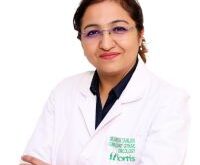Contributed by Dr. Krunal Khobragade, Consultant – Surgical Oncology, HCG NCHRI Cancer Hospital Nagpur
Gastric cancer/ stomach cancer is the 3rd most common cancer in men in India and the second most common cause of cancer-related deaths among Indian men and women between the age 15 and 44. Recent statistics suggest that the cumulative risk of gastric cancer in our country is 1 in 213. The more disturbing fact is that less than 20 percent of patients with stomach cancer in our country present at an early stage, while 50 percent will have locally advanced disease and 25-30% have widespread/metastatic disease. Since November is regarded as gastric cancer awareness month, let’s talk about early recognition of gastric cancer, effective treatment modalities, and prevention strategies.
Understanding stomach cancer helps to know about the normal structure and function of the stomach. The stomach region consists of 5 parts: cardia, fundus, body (corpus), antrum, and pylorus. The first 3 parts of the stomach (cardia, fundus, and body) are called the proximal stomach. The lower 2 parts (antrum and pylorus) are known as the distal stomach. Antrum/distal gastric cancer is the commonest in the Indian population.
Risk factors for gastric cancer?
Risk factors include less consumption of fruits and vegetables, consumption of salty, smoked, and poorly preserved foods, cigarette smoking, tobacco chewing, alcohol, H. pylori infection, and radiation exposure. The risk factors that are not modifiable – advanced age, among male sex, family history, and genetic predisposition.
Progression of stomach cancer
Stomach cancers tend to develop slowly over the years. Before it develops, there are pre- cancerous changes that often occur in the inner lining (mucosa) of the stomach. These early changes rarely showcase the symptoms and therefore goes undetected. Cancers originating in different areas of the stomach may cause different symptoms and tend to have various other outcomes. Treatment options are affected depending on where the cancer cells are located.
When to consult a doctor?
If you have one or more of the below symptoms, it is suggested to consult the doctor:
- Difficulty in swallowing (dysphagia)
- Feeling bloated or full after eating small amount of food
- Baffling discomfort in the abdomen region, usually above the navel
- Severe, persistent heartburn or indigestion
- Unexplained, persistent nausea
- Stomachache
- Persistent vomiting with or without blood
- Unintentional weight loss
- Fatigue
- Constipation
- Dark stools due to the presence of altered blood
- Swelling in the abdomen
Tests and procedures to diagnose gastric cancer
Upper GI endoscopy (Esophagogastroduodenoscopy or EGD) – A thin, flexible lighted tube containing a micro camera at the end is passed down through the mouth into the stomach to look for signs of cancer. If there are any suspicious area found, a small piece of tissue from that site (biopsy) is taken for the laboratory examination.
Imaging tests: Contrast-enhanced Computerized tomography (CT) of the chest, abdomen, and pelvis or PETCECT. Imaging is primarily used for staging in stomach cancer and for post-treatment response assessment.
Biopsy: A biopsy may also be taken from nearby lymph nodes or suspicious-appearing areas in other parts of the body to confirm the spread of the stomach cancer.
Treatment
The main treatments for stomach cancer are:
Surgery – Surgery may be done to remove cancer cells in the stomach and sometime nearby lymph nodes, depending on the type and stage of stomach cancer. Sometimes the cancer would have affected the other organs and they need to be examined as well like (Endoscopic resection, subtotal and total gastrectomy, lymph node removal, placement of feeding tubes, and palliative procedures).
Chemotherapy – Chemotherapy uses anti-cancer drugs that are injected into a vein or given as normal pills. These drugs enter the bloodstream and circulate to the entire body even to the organs where cancer cells are spread.
Tips to avoid gastric/stomach cancer
Here are few things to be followed to prevent the risk of stomach cancer:
- Being overweight or obese increases the risk of stomach cancer. Working out regularly also helps in lowering the risk of stomach cancer.
- A diet consisting of fresh fruits and vegetables prevents the risk of stomach cancer risk. Fruits rich in citrus like oranges, lemons, and grapefruit may be helpful.
- Alcohol use usually increases the risk of stomach cancer, so avoiding or limiting the consumption of alcohol lowers the risk.
- Avoiding tobacco use.
- Treating H pylori infection – Some early studies have suggested that administering antibiotics to people with H pylori infection might lower the number of pre-cancerous lesions in the stomach and reduce the risk of stomach cancer.
- For people with high genetic risk can consult a genetics professional on getting genetic testing done.
Early diagnosis is key to improving the outlook for stomach cancer. One might want to consider getting a screening test if you believe you are at risk for developing stomach cancer. The chances of recovery are better if the diagnosis is made in an early stage. Consult a doctor if you see any of the symptoms. Diagnosing at an early stage will help in better treatment outcomes.
 Newspatrolling.com News cum Content Syndication Portal Online
Newspatrolling.com News cum Content Syndication Portal Online







